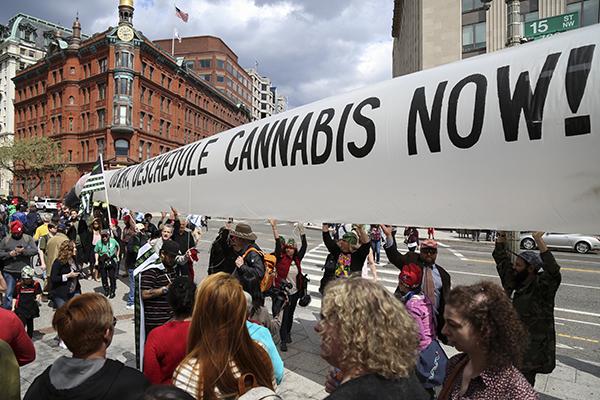D.C. is one step closer to being able to regulate the sale of marijuana, a potential multi-million dollar industry.
D.C. statehood activists rejoiced last month when a judge in D.C. Superior Court granted the city the power to control allocation of its local funds. That decision to increase D.C.’s budget autonomy removes restrictions on spending money to regulate marijuana sales.
Previously, D.C.’s budget had to be approved by Congress – a barrier to regulating the sale of marijuana because marijuana is illegal at the federal level. But now, the District will be able to regulate the sale of products within its city limits – an important first step to begin a potentially booming industry.
If the city implements laws allowing marijuana sales, revenue from taxing the drug could add up to $93.6 million, according to new projections from New Frontier, a firm that studies the marijuana industry. D.C. decriminalized marijuana in 2014, and residents can possess up to two ounces.
Paul Zukerberg, a D.C.-based lawyer who specializes in marijuana cases, said the ruling is one step closer to statehood for the city because now officials can control local income like other state governments.
“The government can now be more responsive to local needs,” he said. “We’ll be able to fund those programs like a regular state.”
At-large D.C. Council member David Grosso has introduced legislation about permitting the sale of marijuana twice because he believes it is a civil rights issue – blacks are disproportionately arrested for marijuana possession nationwide.
He said the D.C. Council would be able to legalize the sale of marijuana using reserve money from previous budget surpluses, but that it would be “tricky” because it could be considered a violation of a federal law about spending federal funds without appropriation, Grosso said.
“If I had the ability to do it myself, I would do it, and I would risk getting arrested for it,” Grosso said. “I think it’s a tricky, risky situation, but I do think it could be done.”
John Kagia, the director of industry analytics at New Frontier, said it would take at least a year for the city to define regulations on marijuana sales.
“Even if budget autonomy does prevail, we’re still looking at another year,” he said.
Colorado, Washington and Oregon have legalized marijuana over the last several years, creating a cottage industry for sales of marijuana and marijuana paraphernalia. Sixteen other states like California, New York and Maryland have decriminalized marijuana, which lowers the fines associated with possessing the drug and removes the threat of jail time.
Kagia added that New Frontier has found about 8 percent of the tourists in Colorado smoke marijuana in the state – a potential financial boon for a city like D.C., which has a steady stream of tourists all year.
“In a city like D.C., the tourist demand can be a significant driver of demand for adult use of cannabis,” Kagia said.
The market for marijuana reached $100 million in Colorado last year, according to the New Frontier Report.
But Kagia said D.C. officials could have a more complicated situation on their hands: Because marijuana is illegal at the federal level, officials must enforce a ban on the drug on federal property like the National Mall.
A group of marijuana activists gathered in front of the White House Saturday to smoke marijuana, and some carried a 51-foot blunt. Two people at the event were fined for smoking in public, according to DCist.
Patrick Monahue, a D.C. resident who spoke at the event, said he has a medical marijuana license in California and would like to see fewer rules regulating the drug.
“It has been legalized, but we aren’t getting the freedom that we should,” Monahue said.
Uma Dhanabalan, a family physician who spoke at the event, said many of her patients would prefer to be prescribed medical marijuana as opposed to prescription drugs.
“This is a medicine that has been around for thousands of years, and it should be available to everyone as a first-line option, not as a last resort,” she said.
Maura Fallon contributed reporting.







